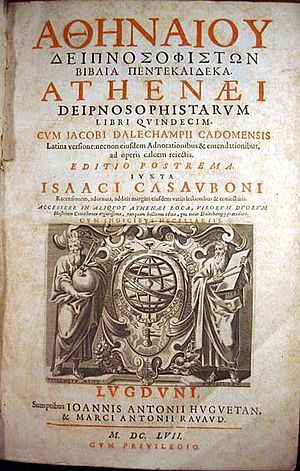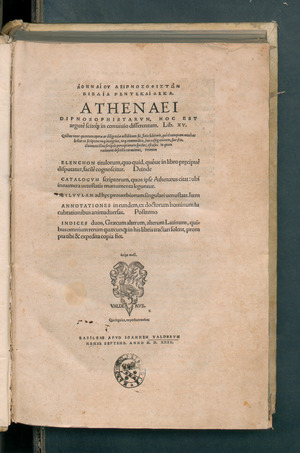Deipnosophistae facts for kids

The Deipnosophistae is a very old Greek book written around 200 AD by an author named Athenaeus of Naucratis. It's a long work filled with interesting facts and stories about Greek writing, history, and old customs.
The book is set in Rome during a series of big dinner parties. These parties are hosted by a character named Publius Livius Larensis. Many different kinds of smart people attend, like experts in language, lexicographers (who study words), judges, musicians, and other guests. They all share their knowledge and have lively discussions.
What Does the Title Mean?
The Greek title Deipnosophistaí (Δειπνοσοφισταί) comes from two Greek words. Deipno- (δειπνο-) means "dinner," and sophistḗs (σοφιστής) means "expert" or "someone very knowledgeable."
So, the title Deipnosophistae describes people who are skilled at dining. This especially refers to the clever conversations that were expected at Greek dinner parties, called symposia. In English, Athenaeus's book is often known by its Latin name Deipnosophistae. It can also be called The Deipnosophists, Sophists at Dinner, or The Learned Banqueters.
What's Inside the Book?
The Deipnosophistae is presented as a story told by Athenaeus to his friend Timocrates. Athenaeus describes a series of dinner parties held at the home of Larensius, who was a wealthy scholar and supporter of the arts.
The book is like a dialogue within a dialogue, similar to the style of Plato. Each conversation is so long that it would probably take several days to happen in real life. Many guests are mentioned, like Masurius, Zoilus, Democritus, Galen, Ulpian, and Plutarch. Most of these guests are probably made-up characters, and many of them don't say much during the discussions.
This book is very important because it gives us a fictional look into the world of educated people during the Roman Empire. It also provides a lot of information about older Greek literature. As the characters discuss classic authors, they quote from about 700 different Greek writers and 2,500 separate writings. Many of these writings would be lost to us if not for Athenaeus's book.
The main topics of discussion include food and wine, fancy living, music, literary gossip, and the study of language. The book also shares the stories behind many famous artworks, such as the Venus Kallipygos statue.
Food and Cookery
The Deipnosophistae is a valuable source for learning about classical Greek recipes. It includes the original text of one recipe from a lost cookbook by Mithaecus. This is the oldest known recipe in Greek and the oldest recipe by a named author in any language.
Other authors whose recipes are quoted in the book include Glaucus of Locri, Dionysius, Epaenetus, and Hegesippus of Tarentum. The book also describes in detail the meal and celebrations at the wedding feast of Caranos.
See also
 In Spanish: Banquete de los eruditos para niños
In Spanish: Banquete de los eruditos para niños
 | Selma Burke |
 | Pauline Powell Burns |
 | Frederick J. Brown |
 | Robert Blackburn |


